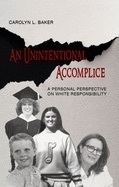📚 Review: An Unintentional Accomplice
📚 Finished Reading: An Unintentional Accomplice by Carolyn L. Baker ⭐️⭐️⭐️

Note: I received a free pdf of this book, with the agreement to provide a review when complete.
Recommended for: people who like autobiographies and who want to pursue racial justice
Gabrielle David, African American woman and publisher of 2Leaf Press, gave guidance to the author and also wrote the introduction. Here is David in the introduction:
Some would suggest that it is the systems that are broken. But none of these systems are broken; it is white people who are broken, but they do not have to be. And broken is not evil. Broken means it can be fixed. Healed. Changed. And recently, quite a few white people are stepping up to acknowledge, repair, and heal. This is what Baker has set out to do, to understand a complicated American structure that holds us all hostage.
The systems, it turns out, are working as designed. Our unexamined assumptions, intentions, and practices need to be re-evaluated, and then we can work together to design systems with better outcomes for all.
—
After the introduction, Baker takes us through the phases of her life, chapter by chapter. Along the way, she examines the ways that she may have benefited from white privilege, and the ways she may have allowed or perpetuated racial injustices. This, in reference to the title, is her being an accomplice. Each chapter is a vignette of her growing awareness of those challenges, and grappling with her thought patterns around them.
One of the interesting angles to Baker’s reflections is that it is clear that throughout her life she has been socially-conscious in many ways, and has spent much of her life serving others. Yet, as Baker shares, that doesn’t mean one gets everything right. This is a useful reminder for all of us.
—
In the main part of the book you will not find many concrete actions to take in order to fight injustice. This is understandable, as it is a work of self-reflection. However, for those who are looking for ways to respond to the book, Baker has provided a couple resources.
Throughout the book, Baker often cites many of the works that helped her along her journey. These are helpfully collected in a bibliography, one which would make a great reading list for people who don’t otherwise know where to start.
Second, an Anti-Racist Checklist follows the main text. This is Baker’s own list of how she is exploring her responses to racial injustices. Many of these may be helpful to white people who are looking to turn their reflection into action.
—
While I would normally prefer a different systematic approach (academic, treatise, essay, etc.) to topics such as this, it was refreshing to read a personal perspective that was both thoughtful and did not make the author out to be a savior, villain, or villain-turned-savior.